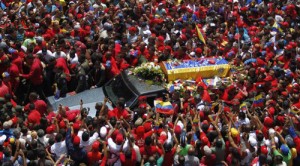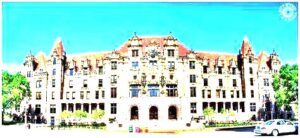In 2007, I was part of a U.S. delegation invited by Presidente Chavez to Caracas for the unveiling of the Dr. Martin Luther bust-Busto Martin Luther King Paselos Insignes. The delegation was organized by Joseph Jordan Director of the Sonja Haynes Stone Center for Black Culture and History (University of North Carolina-Chapel Hill). I was able to see first hand the efforts of the Bolivarian Revolution, like the land reclamation projects. I was struck by the engagement of the people in their society, many of them carried their dog-eared Venezuelan Constitution in their pockets every day. And why not? They had helped to create it. They were genuinely excited about building futures. The knowledge of African and African American History as well as the Black Liberation Movement by the Venezuelan people was remarkable. We were treated like dignitaries while in the country and were given access to the people and to many of the country’s programs like the Comités de Tierra Urbana (Urban Land Committees or CTU).
My comrade, Genevieve Williams Comrie, wrote a great piece for Al-Jazeerah.com about Chavez that I’d like to share because of her unique perspective as an Afro-descendant:
Presidente Hugo Chavez and race : The shift from avoidance to inclusion

“Racism is very characteristic of imperialism and capitalism. Hate against me has a lot to do with racism. Because of my big mouth and curly hair. And I’m so proud to have this mouth and this hair, because it is African.” – Hugo Chavez, September 21, 2005
The death of democratically elected President Hugo Chavez Frias (1954-2013) has evoked serious thoughts and reflections on the meaning of his life and the process he led from peoples and communities throughout the Americas and the world. Despite much criticism by many right wing governments and people in the West, Hugo Chavez led a process in Venezuela that symbolised the new assertiveness and self-consciousness of nations in Latin America that saw a future for themselves, liberated from the heavy-handed, oppressive and economically draining policies of their powerful neighbour from the North.
But along with the symbolism connected to the new politics of authentic decolonisation that many of the centre-left states embraced, Chavez was committed to a process of providing real, substantive support to states in the region who were willing to pursue a course that could result in a real shift in power in the region. What that signified for many of us in the Afro-descendant communities in the Americas, was that the rise of Chavez and the Bolivarian process that the people of Venezuela had embarked on would raise the spectrums of a new kind of politic in the region. We hoped that with the new commitment to social inclusion and the ending of all forms of oppression that the issue of race and racial discrimination would become an acceptable and indeed an essential element of the transformation process in the Americas.
Venezuela and its relations to African descendants in the diaspora
Under his 14-year leadership, Chavez was able to guide unprecedented government initiatives that led to programmes and policies that resulted in significant progress toward combating the historical legacy of racism and discrimination that historically plagued the country. Chavez also provided similar parallel support to other nations with predominantly Afro descendant populations, where their governments were not willing to make it a priority. President Chavez was able to institute many reforms to ensure African descendants in Venezuela could have full and equal access to social, economic and cultural rights.
Also included in his work against racial discrimination is the creation of the “law against racial discrimination”, the incorporation of the category of Afro Descendant in the census, and the creation of Afro Venezuelan Day, as well as the expansion of embassies and consulates in Africa to name a few.
While the United States has a historical pretense of humanitarian support of devastated countries, its record in actually providing expedited support to countries that do not fit into their strategic economic relationships, Venezuela under President Chavez rose to the support and plight of several issues related to African descendants in other countries, including the United States.
After the ravishing of Hurricane Katrina through the Gulf coast in 2005, despite a strained political relationship with the United States government, Venezuela offered aid to the region through its Venezuelan Embassy in the form of mobile hospitals, medical workers, power plants, and food, among others. Venezuela’s offers were overtly denied by the US government (under then President George W Bush).
Haiti is another example of how Chavez has prioritised and ensured that the historical plight of African descendants for economic, social and cultural rights be respected. In light of the multiple natural disasters that have plagued the first free African country in the region since 2010, Venezuela forgave Haiti’s over $395 million dollars in foreign debt, and pledged more financial support to relief the devastation than either the United States or the European Union.
And if that was not enough, since 2005, Venezuela has been leading initiatives in Afro descendant communities such as New Orleans and the South Bronx, providing them with discounted heating oil, and free energy saving light bulbs to poor and low income families during the winter months, and providing grants to community-based organisations to build self-sustaining institutions such as worker-owned cooperatives, and holistic healthcare for women.
Following a legacy
Many African descendants in the region are certainly mourning the passing of President Chavez. He represented a refreshing lesson on upholding human rights, rather than talking about them, through his prioritisation of African descendent issues and politics, not only within Venezuela, but also outside of Venezuela.
Many of us will remain attentive to what the near future of Venezuela holds for it in the next few days and months, to view and see how either a continuum of the current government and leadership or a new government will continue to uphold the strides that were accomplished by President Chavez.
And although he has left this life to join the ancestors, we know that he will always be with us. We are proud of this “African-American” president and with his example we will continue to uphold the principles that he stood for as we struggle for a new world free from domination and oppression.
Janvieve Williams Comrie, is the current Executive Director of the Latin American and Caribbean Community Center. Her previous professional experience include the Office of the High Commissioner of Human Rights Central America Regional Office and the US Human Rights Network in the United States, where she worked directly on race and racial discrimination and human rights. She presently resides in The Bronx, NY.
The views expressed in this article are the author’s own and do not necessarily reflect Al Jazeera’s editorial policy.



